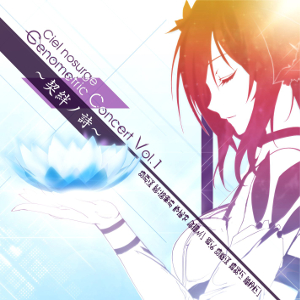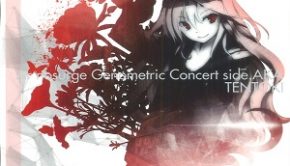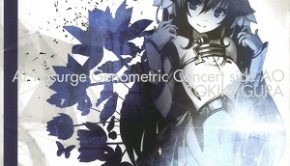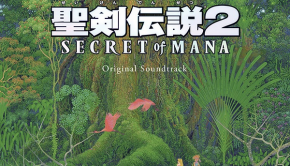Surge Concerto: Ciel nosurge Genometric Concert Vol. 1 -Pact Songs-
 |
Album Title: Ciel nosurge Genometric Concert Vol. 1 -Pact Songs- |
| Record Label: Gust |
|
| Catalog No.: FFCT-0026 |
|
| Release Date: February 27, 2013 |
|
| Purchase: Buy at CDJapan |
Overview
Ciel nosurge Genometric Concert Vol. 1 -Pact Songs- is one of the albums that contain the vocal music for Ciel nosurge ~A Song Offered to the Lost Planet~. Part of the latest IP developed by Gust Inc., Surge Concerto, this title is a prequel for the Ar tonelico series and can be considered an episodic visual novel/simulation game hybrid. Fittingly enough, it also has the characteristic sound of the Ar tonelico series, while also having some of its own touches. Most of this album was composed by legendary vocalist Akiko Shikata. However, Akira Tsuchiya, Haruka Shimotsuki and HIR, all of whom also worked in Ar tonelico, pop up with some compositions and arrangements of their own. To give a thorough assessment of the songs featured in the album, I will consider both the stand-alone music and how they are used in context in considerable detail. Does this album live up to the expectations raised by the songs of its predecessor? Likewise, it’s worthy enough for a standalone listen?
Body
Before we begin with the analysis of the music, I’ll give a brief introduction to Ciel nosurge’s setting: the game is set in the same universe of the Ar tonelico series, which is called the universe of EXA_PICO, but instead of Ar tonelico’s Ar Ciel planet, Ciel nosurge takes place in another planet very far away from it, which has the name of Ra Ciela. In this world, the people are able of using a special form of magic called Song Magic through two methods: either by forming a pact with a special creature called a Genom; or by using a special device called a Cielnotron, which acts as a Genom simulator. Additionally, both approaches to using Song Magic have their own language. Those with a Genom partner must communicate with them in a language similar to Chinese called Keihansoukaishi, whose name can be translated to Emotional Song Pact. The users of the Cielnotron must input voice commands into it by using a special programming language called REON-4213. Alongside Japanese, both of these languages form the lyrics of the songs in the album.
As for the album itself, it opens up with the game’s own opening theme, “To the Songless Hill”. The title makes a rather indirect callback to the series of “Singing Hill” songs that served as openers for each of the Ar tonelico games, as well as their re-arranged versions found in Akiko Shikata’s own independent albums. Composed by director Akira Tsuchiya and sung by Akiko Shikata, the song captures many of the important elements of the game. Following a gong opening, the song introduces a magnificent chorus, a trademark of Shikata’s works, and a lavish orchestra. After both of them simmer down, the song begins proper: from the backdrop of traditional Japanese string instruments, Shikata sings the listener through a gentle melody, which is slightly reminiscent of the previously mentioned Ar tonelico opening themes. The rest of the piece is led to a conclusion by a few choruses that are superimposed over the previous voice. The song itself is pretty short, clocking at 1:28 for total length, but in spite of this, it manages to convey a wide range of emotions: awe, hope, and a tinge of sadness.
In addition to the opening, this song is sung in-game as part of the succession ceremony for the Empress of the planet Ra Ciela. However, this occasion is very special, as Ra Ciela’s sun Bezel is becoming a red giant that will engulf the planet unless something is done about it, so both candidates to Empress have an enormous pressure over themselves to find a solution to this problem. As an extra bit of background information, the two Empress candidates represent two factions known as the Imperial Genometrics Synchronization Mediation Institute, known commonly as the “Earthbound Faction”, and the Imperial Astronomy Wave Theory Laboratory, more commonly known as the “Astronomical Faction”. Each faction has proposed a plan to save the people of Ra Ciela from being swallowed by Bezel, with the Astronomical Faction proposing to convert Ra Ciela into energy and use it to power a spaceship that would carry all of the people in the planet to another one where they can live in peace, while the Earthbound Faction proposes to use the power of all the Genoms in Ra Ciela to stabilize Bezel’s core and restore it to how it was before it became a red giant. As one plan involves the destruction of the planet, and the other doesn’t seem likely to work at the moment, the populace is greatly divided between these two factions. The Astronomical Faction has complete control of all the Cielnotrons in Ra Ciela while the Earthbound Faction regulates the pacts and synchronizations the people can do with the Genoms.
Returning to the album, the next track is “Ahih rei-yah”, whose title translates to “Connected Feelings”, and it also serves as the centerpiece of the game’s first chapter. Sung by Akiko Shikata, this song was also the very first piece of music many heard from this game due to being featured in its earliest trailers, and despite not being exactly my favorite, it’s still a very enjoyable listen. After starting with a soft chorus, the song rises briefly to then give place to a softer solo voice after a brief interruption by a sound similar to a water droplet, which gets punctuated by traditional Japanese percussions and backed up by koto. Then, it crescendos once again as Shikata sings the song’s title, retaining the same gentleness and strength up until it climaxes. It was at this point that the song originally ended in the game. However, in the album release it gets expanded, beginning with a bridge formed by bells and Shikata’s rising vocals. The song then repeats its structure once again, although in a lower tone, as if she was losing heart or becoming sad, which is also reflected on the lyrics. However, once it reaches again the song’s title, the song becomes uplifting once again and remains like this until the end, in which the instruments fade away and leave only the voices singing in a way similar to a Japanese traditional song. As is evident from the descriptions, there is a heavy Japanese traditional influence on this song, which makes it quite exotic, while also retaining a lot of the charm present in the pieces composed and arranged by Akiko Shikata herself.
In-story, this song was sung by the game’s heroine, Ionasal.kkll.Preciel, more commonly known as Ion, who herself is the Empress candidate representing the Astronomical Faction. However, she was afraid of her duties and after her first appearance in public became a complete disaster due to the people pushing her around in an attempt to win her favor, she ran away, getting lost in the city of Manjusara until a boy called Tabou found her and invited her to live with his family and friends. Ion became used to living with Tabou’s family and his friends, Cas and Pram, and had several fun days with them. Still, one day, she learned that Manjusara had a great problem: given that Bezel had grown so much, its solar winds were extremely fierce and occasionally caused great damages to Ra Ciela’s surface in events that were called Wave Bursts; and given that the Anti-Dynamic Wave Shell dome that used to protect Manjusara from said solar winds had broken down due to its long time in service, Ion decided to make a song that created flowers large and strong enough to protect the city instead. Initially, the flowers were very small and deemed by everyone as a failure, which was caused by Ion herself not having enough energy to make them larger. However, after Ion asked everyone to help her, they began pouring their energy into the song and greatly increased its power, creating several enormous flowers that could shield the city from the Wave Bursts. Given all of this, it’s easy to see why the song is so strong yet gentle: it contains the feelings of Ion wanting to protect everyone, as well as recounting the things she wants to shield the people from.
Following to the next track, “Roar of Earth and Heavens”, the main event of the second chapter, we find ourselves with a rather unexpected change: while this song was composed and arranged by Akiko Shikata as well, it was instead sung by Minami Kizuki. I’ll admit that I’m not familiar with Kizuki and this song is the first time I’ve ever heard from her, despite the fact she has been around in the J-Music scene since 2009. Although her way of singing is somewhat strange for a Shikata-composed song, it isn’t bad at all: it sounds pretty similar to Yuko Ishibashi’s and Azumi Inoue’s previous efforts in Ar tonelico, with some particular qualities I can’t quite put my finger on due to Kizuki being a singer of the Shima-uta style. What characterizes this track is the exchange between sweeping choruses backed up by fast-paced piano parts and more tranquil sections. The latter sections are more similar to a ballad, formed by a soft solo voice, piano, acoustic guitar and violin; which then begins to build up towards another fast part. After this, we come across the bridge, which begins with a few choruses to then fade away before a piano and violin duet. Then the song repeats this same structure, finishing right before the bridge.
In-story, this song was created and sung by Kanoyeel.kkll.Preciel, or Kanon for friends: she is the other empress candidate and Ion’s rival for the throne. However, unlike Ion, she decided to accept her responsibilities as a potential empress and thus has been working day and night to improve the livelihood of the people, which is why she is quite stern towards her rival. However, the singing of this song causes the complete destruction of all the Cielnotrons stored in the Dream Sphere: an artificial planetoid of sorts that floats above Ra Ciela and it’s inhabited by a large number of people. Of course, this would leave a large part of its inhabitants unable to use Song Magic due to lacking a partner Genom, as well as causing several other problems due to the populace in Ra Ciela being so dependent of them: in their world, being without a Cielnotron would be like being without electricity and internet in ours. However, Kanon found that this would save its people temporarily, and finding that in this case the whole was more important than the needs of each separate individual, she decided to proceed with it. This is why the song has such a frantic pace, yet still a lot of strength can be felt from the vocals and instrumentation.
The next track is one that I personally like very much, though I haven’t yet been able to decide if I like it more than the final track of the album, as they are both excellent. The song in question is titled “QuelI->{ein te hyme};”, which translates to “Alongside the Bonds”, and it is the first song in the game to be sung in the REON-4213 language. The song initially begins with some choruses backed up by an ocarina, which falls silent to give way to a very soft singing. After this, the song proper begins with Shikata singing over some lovely guitar parts coupled with the ocarina; it sounds really beautiful despite some hints of hesitation and sadness. The song changes key and tone slightly after this, but still keeps the same calm and subdued pace to finally end with a beautiful ocarina and violin duet. However, this was all just a prologue that Shikata included to better express Ion’s feelings, as from that point on, the parts of the song shown in the game itself begin. Starting with some strong metal percussions, the instruments fall silent as Shikata continues singing with some strong backing choruses behind, and once this brief section ends, the rhythm changes to a more fast-paced one as the ocarina leads the melody into the next few chorus sections, which continue keeping the same energy as the previous ones. Shikata then sings the portion of lyrics containing the song’s title, and while it doesn’t feel as strong as the previous chorus, it instead transmits a great gentleness and emotion. After this, a line of lyrics in Japanese with the ocarina and some percussion backing them lead the song to its climax: the song changes tone again, the strings take over the melody, the rhythm accelerates even further and Shikata begins singing with all her strength. I have to say that the prologue and the change into the game version took me by surprise the first time I heard this song, but I still liked it quite a bit.
Story-wise, this song doesn’t have any grand effects like the previous two, as it was intended to express Ion’s feelings. After she failed in stopping Kanon from using Roar of Earth and Heavens, Ion fell into depression until her friend Nay convinced her to give a performance in an upcoming festival of large proportions. However, as Ion was a lousy dancer, Nay contacted a hacker friend of hers called Shirotaka, who used a predecessor device to the Cielnotron called the G2Tron and hacked it so Ion could use it as a Cielnotron without the heavy restrictions these devices have associated. Using this, Ion was able to partake in the festival, sing this song to demonstrate her feelings as candidate to Empress to the people, and still give a magnificent performance due to the song being programmed to activate the mechanisms of the stage where Ion was standing and give quite a show without needing to move as she sang. Due to this the piece being made mainly to express feelings, it’s easy to feel hesitation or even some fear out from how nervous the lines at the start sound, but the second half is really energizing and uplifting, and it could be easily that which lights up the sad and depressing days for some people, as it did with me.
And with this, we come to the final song in the disc, which is titled “Neptlude (Class::NEPTLUDE=>extends.TX_CLUSTERS/.)” You might think that the part of the title between the parentheses is similar to that of the EXEC and METHOD formats that were used in the Ar tonelico songs and you would be right: Class songs are all programs stored in the Song Magic library known as the ClassDrive, which is like an internet site where the users of the Cielnotrons can go and download Song Magic others have made to use them. Well then, leaving the setting explanations aside, this song was composed by Haruka Shimotsuki and it is sung by her as well. It starts with Shimotsuki singing some choruses over a beautiful harp background, until a sonorous percussion comes in and the choruses are replaced by Bulgarian-styled voices. Once this section is over, Shimotsuki comes in again with a much softer voice than in the beginning, in conjunction with the very dreamy timbres of percussions, guitar and bagpipes. When these ideas are reprised, the main section has more of a soaring feeling due to the way Shimotsuki sings near the end, as well as having a key change in the Bulgarian singing sections.
As for its role in Ciel nosurge’s story, this song was sung by Nay two times, the first of which was unwittingly following the schemes of a man Nepseal. This was the CEO of the Tz-Tube Company, the largest corporation in Ra Ciela, and he had invited her and Ion to come see the Neptron they were developing, which was a device that was supposed to substitute the Cielnotrons due to being able to use eight times the power the Cielnotrons could use. However, he needed Nay to sing the activation song for this, Neptlude, as no one else had the special characteristics she had of being able to sing Emotional Song Pact and REON-4213 in the same song, as well as needing Ion to Dive into the mind of something to open a door that was needed for the successful execution of this song. In the end, this was just a ruse to gain control of the artificial intelligence that controlled the Cielnotron network: REON, as the song was designed to wake up REON’s sleeping consciousness and ego in a state in which Nepseal could control it, so he could use it to become the lord of all of Ra Ciela. However, Nepseal didn’t consider the possibility that REON would take this plan and use it in its favor, so when Ion opened the door and REON’s consciousness awakened; it overtook Ion’s body and sealed her consciousness away in the darkness. REON then began causing all sorts of disasters throughout the HQ of the Tube Company and left Ion’s soul at the border of fading away, until Nay came in and sang Neptlude once again to send REON back to where it was and allow Ion to regain her body, using the feelings of all their friends in order for Ion to not lose the will to come back to life. Given all of this, it’s easy to see why the song has the tone it has: gentleness and a little bit of desperation for wanting to save another person, which is also reflected in the lyrics, which talk about a girl that lived locked in the darkness and thought of herself as a shadow until the day in which she first saw the light, and saw how she actually was.
Summary
As typical of Gust’s composers and vocalists, the album is a great work in composition, arrangement, lyrics, instrumentation and vocals. Unfortunately, the small number of tracks cause it to lose a point due to only having around half of tracks that its predecessors, the Hymmnos Concerts had. 1890 JPY seems steep for an album featuring just five songs and 20 minutes of music. Fortunately, the few songs it has are very enjoyable themselves: there’s quite a range of styles, from Japanese traditional music to folkloric European singing. Fans of the Ar tonelico soundtracks and games should quite like this effort as well, given both have a very similar sound, as also should the fans of any of the singers involved in the project. The melodies each song has, as well as their lyrics, are quite expressive and powerful. Like in Ar tonelico the songs work best in context, where they are wonderfully interwoven into the mythology and used memorably in specific scenes. However, they are also done well enough to be able to stand on their own.
Do you agree with the review and score? Let us know in the comments below!
4.5
Posted on March 19, 2014 by Gerardo Iuliani. Last modified on January 19, 2016.














